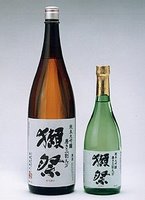 We were in for a big night, as Saké Hana ran an exclusive tasting featuring all Dassai sakés, including several "available only in Japan" types.
We were in for a big night, as Saké Hana ran an exclusive tasting featuring all Dassai sakés, including several "available only in Japan" types.First, a little backround information about Asahi Shuzo, a small brewery located deep in the mountains of Yamaguchi Prefecture:
Based in southern most island of Kyushu, Asahi Shuzo is a small yet vibrant kura whose motto, loosely translated, is "to produce enjoyable sipping sakés, not for sake of profit or getting drunk."
The end result is series of sakés that spare no expenses. Among the notable facts include:
* The minimum seimaibuai is 50%; technically, all Daiginjo-grade sakés;
* Their Junmai Daiginjo is polished down to miniscule 23%, the most refined available in the U.S.;
* Incidentally, the process of polishing rice down to 23% takes 3 days and adds several hundred thousand dollars to the overhead (no compromise!);
* As a result, 50% polished saké is referred to merely as "Junmai Ginjo" here;
* All the sakés are produced using the famed Yamadanishiki rice, the king of "sakamai" (saké rice); and finally,
* All the sakés are produced in the "Junmai" style of using just rice, water, and yeast.
With such hefty credentials, I was very excited to try their standards (tasting notes of "23" and "50" are here, while I reviewed Nigori in August) as well as their rare selections.
 The first of rare style was the Dassai "50" Nama Genshu (SMV: +5, Acidity: 1.1, Rice: Yamadanishiki, Seimaibuai: 50%, Yeast: N/A), the unpasteurized and undiluted style. Although the nose was mildly fruity, similar like the regular "50," the difference was evident on the palate, where depth of the flavor was noticeable, as well as crisp vibrancy.
The first of rare style was the Dassai "50" Nama Genshu (SMV: +5, Acidity: 1.1, Rice: Yamadanishiki, Seimaibuai: 50%, Yeast: N/A), the unpasteurized and undiluted style. Although the nose was mildly fruity, similar like the regular "50," the difference was evident on the palate, where depth of the flavor was noticeable, as well as crisp vibrancy. The next on the list was the Dassai "Migaki Sanwari Kyuubu" Junmai Daiginjo, a.k.a., Dassai "39" (SMV: N/A, Acidity, N/A, Rice: Yamadanishiki, Seimaibuai: 39%, Yeast: N/A). Of all the sakés that Dassai carries, this one had the profile most like a Junmai Daiginjo, with a subtle nose, soft approach, fruitiness, and harmonizing sweet/bitter balance.
The next on the list was the Dassai "Migaki Sanwari Kyuubu" Junmai Daiginjo, a.k.a., Dassai "39" (SMV: N/A, Acidity, N/A, Rice: Yamadanishiki, Seimaibuai: 39%, Yeast: N/A). Of all the sakés that Dassai carries, this one had the profile most like a Junmai Daiginjo, with a subtle nose, soft approach, fruitiness, and harmonizing sweet/bitter balance. Then Sakurai-san threw us the variation of their flagship, the "Enshinbunri Migaki Niwari Sanbu," a.k.a. Dassai "23 Centrifuge" (SMV: +4, Acidity: 1.1, Rice: Yamadanishiki, Seimaibuai: 23%, Yeast: "Dassai"). As the name may indicate, this went through a pressing method where a mash is put through a spin cycle, and the saké is extracted by the use of centrifugal force. The resulting saké was rich, smooth, and round in texture, and generally mellow in flavor. If I didn't know any better, I would have guessed this to be made in a Shizuku style. Incidentally, they do make "Centrifuge" style for Sanwari Kyuubu "39" and "50" as well.
Then Sakurai-san threw us the variation of their flagship, the "Enshinbunri Migaki Niwari Sanbu," a.k.a. Dassai "23 Centrifuge" (SMV: +4, Acidity: 1.1, Rice: Yamadanishiki, Seimaibuai: 23%, Yeast: "Dassai"). As the name may indicate, this went through a pressing method where a mash is put through a spin cycle, and the saké is extracted by the use of centrifugal force. The resulting saké was rich, smooth, and round in texture, and generally mellow in flavor. If I didn't know any better, I would have guessed this to be made in a Shizuku style. Incidentally, they do make "Centrifuge" style for Sanwari Kyuubu "39" and "50" as well. The last of the speciality selections was the Dassai "Warm 50" (SMV: +5, Acidity, 1.5, Rice: Yamadanishiki, Seimaibuai: 50%, Yeast: N/A), a saké created specifically for serving warm. In this process, the yeast starter was allowed to ferment for about one full year to really intensify the flavor and give saké backbone so that when it's heated, it won't lose its structure and flavor profile.
The last of the speciality selections was the Dassai "Warm 50" (SMV: +5, Acidity, 1.5, Rice: Yamadanishiki, Seimaibuai: 50%, Yeast: N/A), a saké created specifically for serving warm. In this process, the yeast starter was allowed to ferment for about one full year to really intensify the flavor and give saké backbone so that when it's heated, it won't lose its structure and flavor profile.Just for the heck of it, I wanted to try it chilled first, so I can compare with the other Dassais. The differences were pronounced. While the richer and deeper flavor is noticeable, the biggest difference emerges towards the finish, where there is a mineral-like bitterness that serve to maintain the strucuture in the warm form. The intensity of the flavor was very much like a Kimoto or Yamahai.
When served warmed, the saké had a very distinctive structure. The flavor was intense at the approach and finish, but very mild in the middle. There were hints of nuts and steamed rice, which is very rare for Dassai.
All in all, another resounding success at Saké Hana!

No comments:
Post a Comment